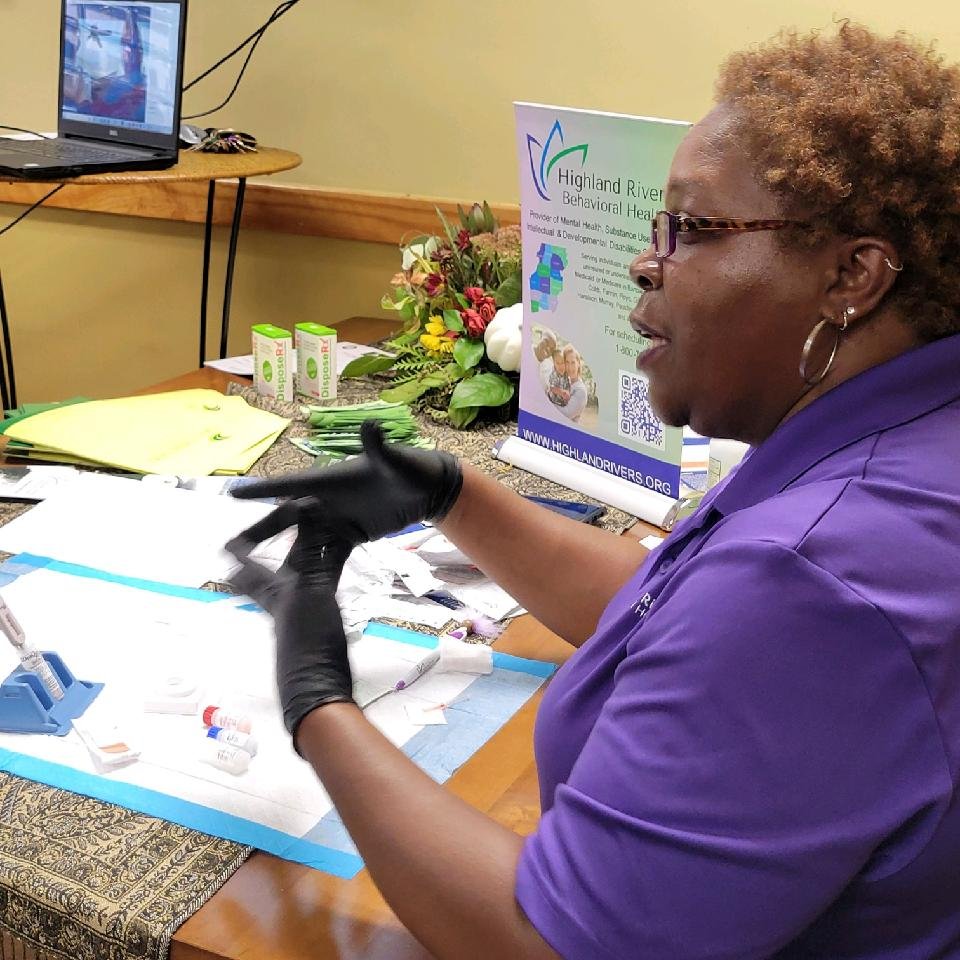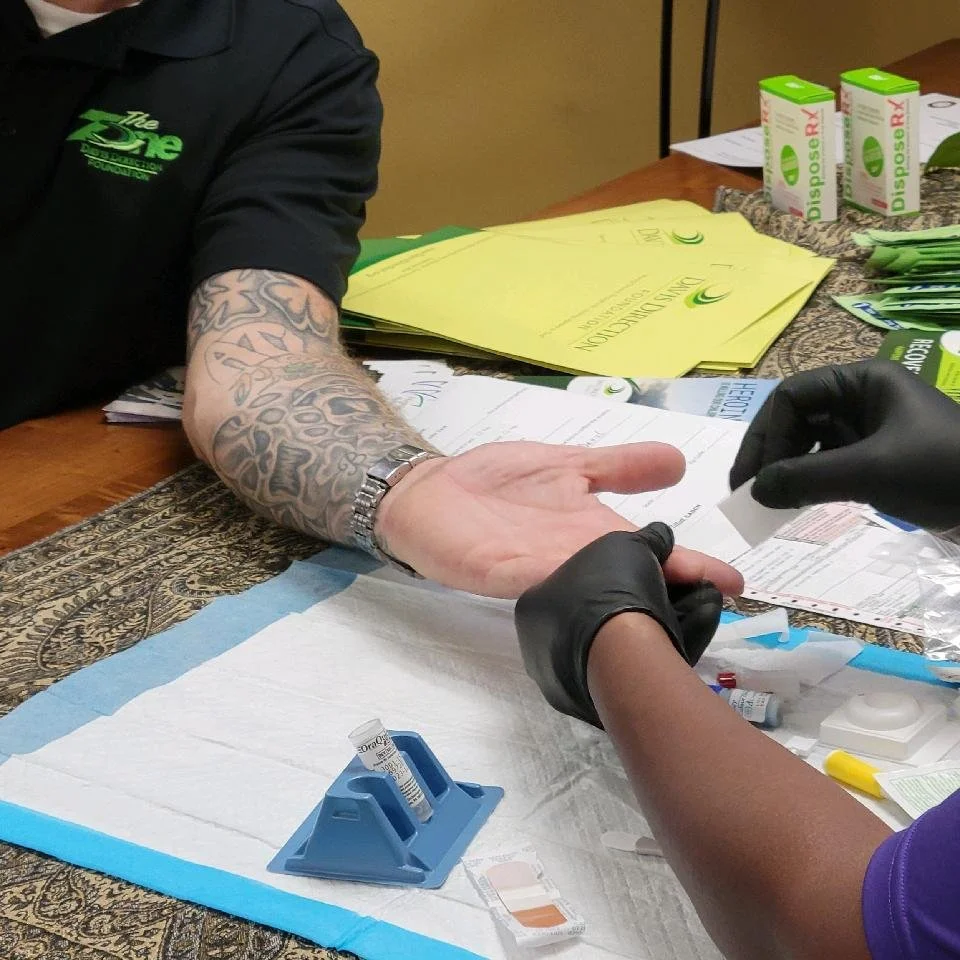Quarterly Report | October - December 2022
Theresha Threadcraft, Aspire Behavioral Health
“Lord, please let me be the best nurse I can be.”
Answer to a Prayer
“Twenty years ago, in nursing school, Theresha Threadcraft, RN asked: Lord, please let me be the best nurse I can be. “Then one day it just hit me. 'Lord, this must be it, here.”
Theresha provides HIV and HCV early intervention services to clients of Aspire Behavioral Health in Albany. So far this year (SFY 2023), she has diagnosed and linked 8 HCV Ab/RNA-positive individuals. She has also diagnosed and linked 3 individuals who are HIV-positive and helped one previously diagnosed who had fallen out of HIV care back into treatment. “This is the best part of the job to me,” says Theresha.
“I get a lot of people who come in who have been off their HIV medication. I make sure that they get an appointment and keep it before they leave.”
Theresha’s contact at the rural clinic, where individuals are referred for HIV treatment, is very supportive. “When I call her, she calls me right back and she gets them into treatment right away. All I have to do is get them there.” Aspire provides transportation to HIV treatment appointments.
At Aspire, individuals entering treatment are offered opt-out HIV and HCV screening during the nursing assessment. The nurses let Theresha know when someone is ready to be tested. In the crisis unit, where she used to work, most of the clients already know her. “Even the new clients hear about me through the old ones.”
And she is well known to the nurses in outpatient services. “I supply them with condoms to give to clients when they talk about testing. When a client is ready for an HIV test or an HCV test, the nurse calls me.”
“I love what I do,” says Theresha. “Seems like this fits me so well; it’s just something I’m supposed to be doing. I love my job and I love the people too. And they know it; I make sure they know it.”
Melissa Jacobs, Ascensa
“We want to see people thrive.”
Creative, Long-term Support for HIV Linkage
Ascensa Health, based in Old Fourth Ward in downtown Atlanta, serves a significant number of the individuals that are homeless.
“It’s important for us to treat the whole person, not just the substance use diagnosis,” says Melissa Jacobs. “Whether they come into the detox unit or the long-term residential program, we try to test everyone for HIV and hepatitis C.”
“Overcoming a substance use diagnosis is hard work. But when an individual is ready, the work that they do here can open the door to a lifetime of recovery – not just recovery from substance use but from HCV; and for someone with an HIV diagnosis, the treatment can literally save their life. We try to share our hopes for them; hope for a healthy, rewarding life. A life of being there for loved ones.”
Melissa sees more resistance to the testing, diagnosis, and treatment of HIV than HCV. One nurse met with an individual newly diagnosed HIV+ 5 times before he agreed to treatment. “It can take time for someone to trust that their status is confidential and the medication effective,” says Melissa.
When an individual is diagnosed with HIV, Ascensa takes a slightly unusual approach to supporting their HIV treatment. “After we schedule the appointment, we give the individual a round trip MARTA card and give them the responsibility of checking in with us,” says Melissa. “They are required to call when they arrive and again after they’re done with the appointment. Finally, when they get back, they bring documentation from the appointment to their assigned nurse. Most keep their agreement.”
The length of stay in the detox unit ranges from 7 – 20 days and individuals may stay in long term residential treatment for up to 12 months. But whether an individual with an HIV diagnosis leaves detox to go into transitional housing, or graduates from transitional housing to an apartment, the Ascensa team ensures that they move to a location where, not only that they will have recovery support, but it will be convenient for them to continue their HIV treatment. “We want to see people thrive,” says Melissa.
Angela Newman, Advantage
“I believe that anyone diagnosed with HIV should not have to go through that first appointment alone.”
Hands-on Approach to Linkage
This quarter, Angela Newman of Advantage diagnosed two individuals HIV-positive and accompanied them to their first medical appointment. “I believe that anyone who is diagnosed with HIV should not have to go through that first appointment alone,” says Angela.
“Some people have lots of support – and some have absolutely no one. Either way, the initial process at the Ryan White clinic is so important that I make sure I’m with them through the whole intake. It can take two or three hours during which they answer detailed, personal questions and fill out paperwork. At some point during the process, most break down crying.
“The clients that we serve here are struggling with a mental health or substance use diagnosis, or both. Getting an HIV diagnosis and then having to go through that intake is no small feat; my support could be the difference between someone entering treatment or walking out.”
Angela also believes in the difference that education can make. “It's surprising to me that in 2023 people know so little about HIV; they know more myths than facts. The phrase is over-used but I truly believe that knowledge is power. I love this work; people actually come back and tell me about the ways they were safer because of the education that I gave them.”
Beyond attending the first medical appointment, Angela looks for other ways to help individuals succeed at HIV treatment. “One individual who is HIV-positive listed me as his emergency contact with the pharmacy. When the pharmacy can’t get in touch with him, they call me. He has a prepaid phone; sometimes it works and sometimes it doesn’t. But I text to let him know that the pharmacy is looking for him to find out where to deliver his medication. He may not answer me right then, but a day or two later he’ll text me back and say, ‘Hey, I got my medication.’”
“Years ago I worked as a program manager for a mobile HIV testing and counseling program in New York City. After we diagnosed someone, we didn’t see them again and it haunted me. I always wondered what happened: Did they go to the appointment? Are they OK? When I came to Advantage, it was a second chance. A chance to be there, to get them started and, hopefully, to see them reach and maintain an undetectable viral load.”
Shannon Tillett of Highland Rivers/Cobb Presents
This quarter Shannon Tillett discussed HCV prevalence and linkage and demonstrated an HCV test with a group of Cobb County officials including Cobb County DA, Flynn Broady. At her invitation, a client shared the experience of being linked and cured.
HIV Totals - 3,254 HIV Tests, 8 New Confirmed HIV+ Diagnoses
During Q4/2022, Imagine Hope partner agencies screened 3,254 individuals for HIV. Of those, 100% received their results, 8 newly diagnosed HIV+ individuals were referred to care and of those, 7 were confirmed linked to treatment. This quarter Early Intervention Services workers provided on-going support to 81 HIV+ individuals and re-linked 12 previously diagnosed HIV+ individuals who had fallen out of care to medical treatment.
HCV Totals - 2,713 HCV Tests, 156 New Confirmed HCV/RNA+ Diagnoses
During Q4/2022, the Imagine Hope HCV Program screened 2,713 individuals for HCV. Of those, 156 were confirmed RNA+ or chronically infected with HCV. During the same period, 65 HCV+ clients completed the first step in the linkage continuum when they received liver health/HCV education and 39 were confirmed linked to medical treatment.






